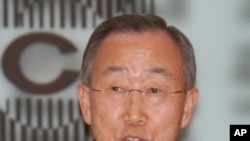As leaders of the top 20 economies prepare to negotiate ways to keep the global economy growing, the United Nations secretary-general asks them to take into consideration the world's poorest and most vulnerable people. The UN chief is in Seoul for the G20 summit beginning Thursday.
The secretary-general is not known for his blunt statements. But Ban Ki-moon is being uncharacteristically direct regarding this week's G20 summit. He says the driving question for the leaders must be "what does it mean for people?"
The secretary-general is calling on the leaders of the world's biggest economies to not think "narrowly about development and economic growth."
Mr. Ban said Wednesday in Seoul that Group of 20 leaders must overcome their wide differences on currency valuations and economic imbalances.
"I'm concerned that there is some divergence of opinions among the G20 over these issues, but I believe that still it is absolutely necessary that the G20 leaders are united and coordinate their policies. This is a time for unity," he said.
Earlier in the day Mr. Ban, a former South Korean foreign minister, met with the country's president, Lee Myung-bak. Mr. Ban says he is very hopeful the summit host's leadership will lead to a successful outcome.
The two-day summit begins Thursday.
G20 officials describe the debate among officials drafting the summit communiqué, to be released Friday, as quite heated.
The United States faces criticism for the Federal Reserve's decision to spend $600 billion to buy bonds. The move is intended to stimulate the economy by putting more cash into the banking system, which can then be loaned to businesses and consumers.
But critics say it effectively keeps the dollar weak, breaking a pledge last month by G20 finance ministers not to competitively undervalue their currencies.
There is also opposition, especially from China and Japan, to a proposal to set specific targets for trade account imbalances. Both the U.S. and South Korea endorse that idea.
China's exchange rate policy will also be in the G20 spotlight. The U.S. and European Union are among the G20 members accusing Beijing of deliberately holding down the value of the yuan for years to benefit Chinese exporters.




